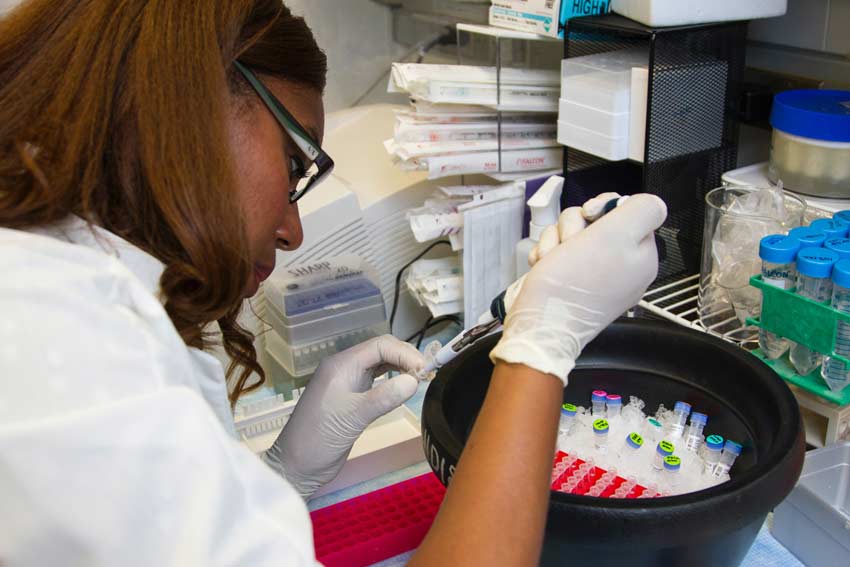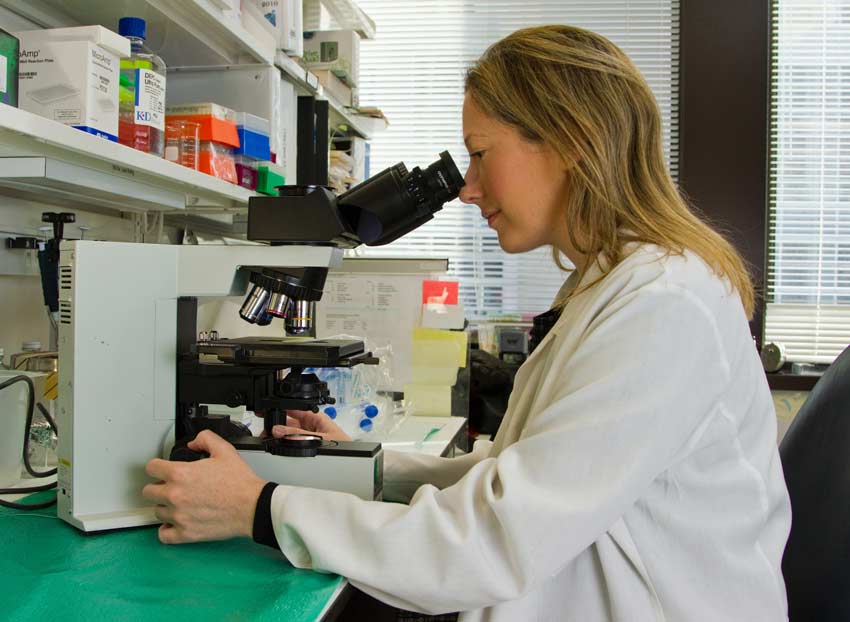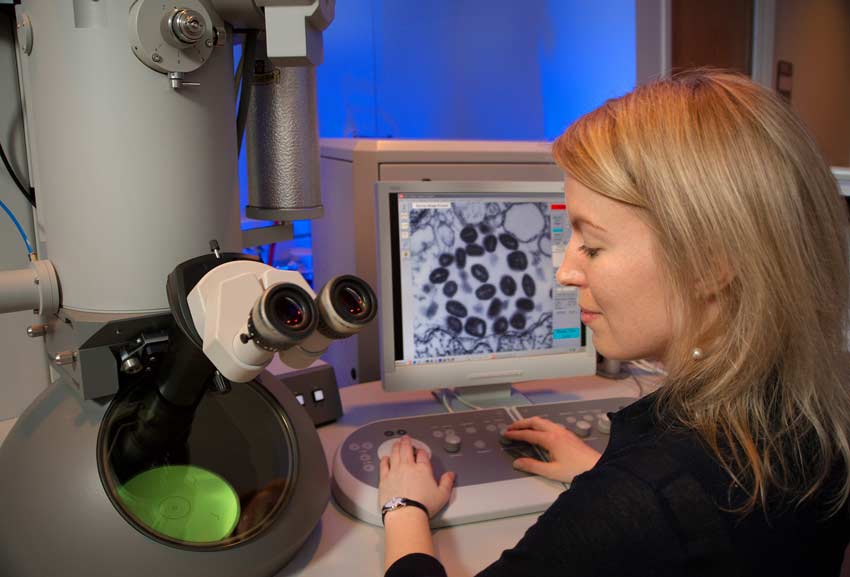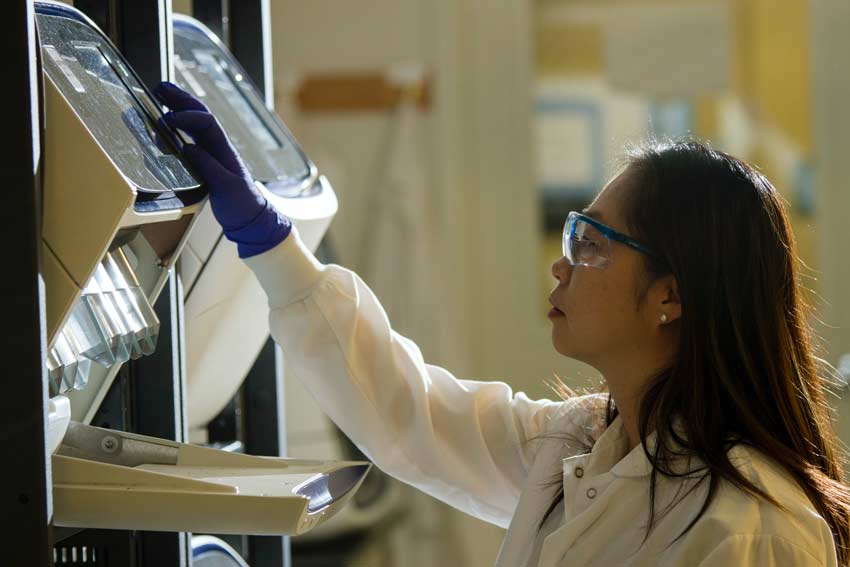Discover more about what the practice of biomedical research entails, the variety of job opportunities available, and how you can kickstart your career to become a biomedical researcher today.
1. Role of a Biomedical Researcher
Biomedical researchers employ scientific research to help people live healthier lives. Likewise, they plan experiments to test and develop novel treatment approaches, evaluate medical data to look into infections and chronic diseases, and create social programs to improve population health outcomes.
The benefits of biomedical research have helped everyone in one way or another. Scientists try to better understand the origins and treatments of diseases through the development of new drugs, vaccines, and procedures to prevent or treat diseases, as well as the safety testing of items we use every day.
Contents: Jump to Section
2.2 Entrance Exams
2.3 Academic Qualifications/ Options
2.4 License Required
2.5 Internship/ Work Experience Required
2.6 Cost of Tuition and Training
2.7 Competition & Scope in India for Biomedical Researcher
2.8 General Age to Start Professional Career for Biomedical Researcher
2.9 Governing Bodies
3.2 Companies & Institutions That Employ Biomedical Researcher
3.3 Growth Prospects
3.4 Entrepreneurship Opportunities
3.5 What is the Salary of Biomedical Researcher in India?
4.2 Top Universities in World
4.3 Famous Personalities
4.4 Useful Links
1.1 Difference between Biomedical Researcher and Biomedical Engineer
While professionals in both fields require medical knowledge, there is a stark difference between the work they practise. In simple words, biomedical researchers focus on diagnosing, treating and preventing human diseases. To further explain, they are more likely to work with clinical drug trials, which test medications or drug combinations against specific diseases.
Biomedical engineers, on the other hand, develop devices to help those seeking different medical treatments. For instance, a biomedical engineer may design and test an artificial limb, then observe how it performs on actual patients and revise the design as needed.
2. How to Become a Biomedical Researcher in India
This article is a must-read for those curious to know how to become a biomedical researcher in India. To pursue a career as a biomedical researcher, you must take up the science stream (PCMB) in 11th and 12th grade and qualify for the appropriate competitive exam to get admission to a biotechnology or biomedical college. Furthermore, the field requires a significant amount of ideation and research, making it a compelling and well-respected career path.
2.1.1 Courses Taken at School
Physics, chemistry, biology, math.
If you are aspiring to become a biomedical researcher, you must take up the science stream in 11th and 12th grade. Physics, chemistry, biology (PCB) is ideal as this career path demands a lot of scientific knowledge. Additionally, taking up mathematics as one of your subjects (PCMB) is also essential to clear JEE entrance exams in India.
Apart from that, mathematics might also be useful in college as some subjects such as genetics, biostatistics, and epidemiology requires calculations.
2.1.2 Courses Taken at College: Biomedical Engineer Course Requirements
Cancer biology, Biostatistics, Human psychology, and more.
It’s always a good idea to know what classes you’ll be studying in college if you’re wondering how to become a biomedical researcher. Therefore, below are some of the subjects I studied and would recommend to students:
- Cancer biology
- Biostatistics
- Human physiology
- Pathophysiology
- Immunology
- Animal tissue culture
- Lab techniques
These topics are certainly beneficial and closely related to the field. Apart from that, depending on the institute where you will be studying, you may be able to take a few other courses.
2.2 Entrance Exams
JEE- Advanced (Joint Entrance Examination – Advanced) and private college entrance exams in India; GRE and TOEFL for international universities.
To study Biomedical Sciences in top Indian colleges like IIT’s that are solely on the basis of merit, you will have to take the Joint Entrance Exam (JEE) after 12th grade. Also, a lot of other private Indian colleges conduct their own entrance exam to shortlist students. To keep the options open it is always better to give multiple exams and apply to colleges accordingly.
For most international programs you need to take GRE and TOEFL. However, the course tuition is comparatively quite high, although many universities offer financial aid even to international students. Therefore, your willingness to pay the tuition fee, your GRE and TOEFL scores in comparison to other applicants, your academic and professional profile, all play a part in deciding the ultimate college to enroll in.
2.3 Biomedical Researchers Qualifications/ Degree Required
A bachelor’s degree is the initial requirement, especially for pursuing a master’s in biomedical sciences. Specifically, a degree in pharmacology, molecular biology, genetics, biochemistry, or chemistry is recommended for those who want to focus on their desired field from the start. A majority of biomedical researchers have Ph.D. or master’s degrees, as well as extra specialized training.
2.4 License Required
No.
If you’re considering how to become a biomedical researcher, you might be wondering if you need a license to do so. This occupation, however, does not require a professional license to practise. As a result, once a student has completed his degree, they can begin working as a fresher.
2.5 Internship/ Work Experience Required
Highly recommended.
In most universities, it is mandatory to do a six months final dissertation project towards the end of the course in order to successfully graduate. Besides, it is preferable to have internship experience as it provides students with hands-on experience in the field. Also, it improves their chances of being hired by large organizations.
2.6 Cost of Tuition and Training: How Much Does It Cost to Become a Biomedical Researcher?
The tuition fee for an undergraduate degree in biotechnology or biomedical sciences is usually around ₹40,000 for the entire course of 3 years. Of course, depending on the college, it could be more or less.
However, for a postgraduate degree in biomedical sciences, the tuition and training cost in this field is quite high. In the United States, the typical tuition rate for a master’s in biomedical sciences in a reputable university might range from $40,000 to $60,000 per academic year.
Aspirants can also pursue their masters and Ph.D. together. Although, it is advised to complete the Master’s degree first as it can help the student get more research experience, industry exposure, and more time to explore their interests in this field.
2.7 Competition: How Hard is It to Become a Biomedical Researcher?
Very competitive.
This career is exciting with lots of possibilities for lab work, administration, research, education, and consulting. In India, the competition for entrance exams is mid-level. But, due to limited job opportunities, it is highly competitive in this field if you want to become a biomedical researcher.
Whereas in the US, the competition for college applications and for jobs is both of high level as thousands of people, from all around the world apply for the same position.
2.8 General Age to Start Professional Career for Biomedical Researchers
22-25, depending on your education.
Generally, students can start a professional career in this field after graduation. Thereby, having a minimum graduation qualification is necessary to become a biomedical researcher. For the most part, students also pursue their master’s degree as it gives them an edge over other applicants and provides several opportunities to start their career.
2.9 Governing Bodies
No.
There is no governing body for biomedical in India.
3. Professional Opportunities/ Career Growth for Biomedical Researchers
3.1 Specialisations/ Sub-Professions
There are several subfields in biomedical sciences. Listed below are some specializations under it.
- Pharmacology
- Molecular biology
- Genome sciences
- Neuroscience
- Immunology
- Infectious diseases
Once again, I would like to stress the importance of internships and co-ops; gaining experience through them will help you understand and discover your research focus.
3.2 Companies & Institutions that Employ Biomedical Researchers
Professionals in biomedical science have the unique opportunity to work in both the private and public sectors, allowing them to tailor their career paths to their own interests. Generally, research scientists are hired by universities for academic research. They may also be hired by pharmaceutical, and biotech companies.
Besides, some of the top international companies that hire biomedical researchers are Merck, Pfizer, GSK, and Novartis.
3.3 Growth Prospects
Immense growth prospects.
There are many pressing medical problems today that demand the knowledge of biomedical science specialists, from unforeseen conditions like the COVID-19 pandemic to the ongoing aging of the global population.
Therefore, there are tremendous growth prospects in this field. Interesting opportunities have arisen for people with the precise knowledge and skills set pertaining to technical expertise, consistency, networking, and leadership qualities.
Research scientists who portray these skills are promoted to managers, directors, or even vice presidents. Also, they are hired by universities for academic research which is primarily concerned with making new discoveries for the benefit of the scientific community and is funded by the university itself.
3.4 Entrepreneurship Opportunities
Yes.
There are numerous opportunities for start-ups in this field. The two main subcategories of scope for entrepreneurs are pharmaceuticals and therapeutics.
In pharmaceuticals, clinical trials, pharmacological research, and safety profiles of drugs are all a part of various roles a start-up pharmaceutical company could indulge in.
Whereas in therapeutics, rather than drug development start-up companies can focus on how medications are utilised and administered in the context of disease therapy.
Though both subcategories require a large amount of capital for research and equipment, start-up companies usually raise funds with the help of sponsors and crowdfunding.
3.5 What is the Salary of Biomedical Researchers in India?
In India, the average salary for fresh graduates with a bachelor’s degree is around ₹4-6 lakhs p.a. However, the pay scale will increase gradually and may vary depending on the city, experience, and the company. Whereas, for fresh graduates with a Master’s degree, the salary in the first year is around ₹50 – 60 lakhs p.a in countries like the US.
4. Further Resources
4.1 Top Universities in India
- IITs (Indian Institute of Technology)
- Delhi Technological University
- Vellore Institute of Technology
Generally, graduating from any IIT campus or other esteemed colleges mentioned above will provide students with the opportunity to work in a reputable industry.
4.2 Top Universities in World
- MIT (Massachusetts Institute of Technology)
- Stanford University
- The Johns Hopkins University School of Medicine
- Harvard University
For the most part, graduating from one of these universities will provide students with great job opportunities.
4.3 Famous Personalities
Jennifer Doudna, Feng Zhang, Craig Venter.
Jennifer Anne Doudna is an American biochemist who has contributed significantly to biochemistry and genetics, including pioneering work in CRISPR gene editing. Also, for the creation of a technology for genome editing, she and Emmanuelle Charpentier shared the Nobel Prize in Chemistry in 2020.
Additionally, other amazing women who inspire me are Marie Skłodowska Curie, Jane Goodall, and Kalpana Chawla.
4.4 Useful Links and Resources
Research Paper Writing Service
.
Curated & Edited by Akarshi Srivastava (CareerNuts Staff)
Read next:
Biomedical Research Career Path: Is Biomedical Research Good Career?
Is biomedical research career path the right profession for you? Do you think you’ve got what it takes to work in this industry? From challenges to daily tasks, Boston-based biomedical researcher Aishwarya Srivastava discusses everything you need to know about the profession.

Aishwarya Srivastava is a biomedical research associate working in the T-cell process development department at TCR² Therapeutics in Cambridge, Massachusetts. She has a Master of Science in Biomedical Science (MS) degree from Northeastern University. She also has a Master’s in Technology degree in biotechnology (M.Tech) from Padmashree Dr. D.Y Patil Vidyapeeth. She works in the field of immuno-oncology and is passionate about supporting the development of novel therapeutics to help cancer patients through cell therapy.
Originally from Mumbai, she currently resides in Boston, Massachusetts. In her free time, she enjoys biking, baking and exploring nature.










